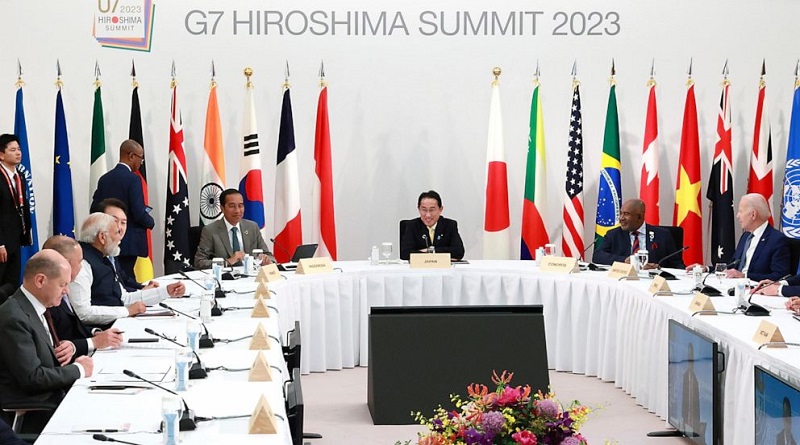G7 in Hiroshima fails to deliver bold climate action
This G7 Summit in Hiroshima was an opportunity for leaders to commit to a rapid phase-out of all fossil fuels. But the acknowledgement of the need for an accelerated phase out of unabated fossil fuels touches on a fraction of the urgency required to achieve the 1.5 target. As in the 2022 communique, the communique involves major loopholes that contradict stated climate ambitions.
May Boeve, 350.org Executive Director says: “Where there was an opportunity to accelerate a renewable energy transition that would bring about energy security, accessibility, and keep us on track to meet climate targets, the G7 have chosen to remain on a fossil fuelled collision course. Despite a week of sustained global calls from civil society, G7 leaders have let down their constituents on the frontlines. The final G7 communiqué does not heed the bold calls needed for our times and fails to include concrete plans to end the fossil fuel era. Instead of taking decisive action to tackle cost of living, energy, and climate crises, the text plays around the edges.”
The promotion of fossil gas as a transition fuel poses disastrous impacts for the climate. Citing the need to phase out dependency on Russian energy, the G7 have left the door open for publicly supported investment in the gas sector as a temporary response. This is in clear contradiction of the Paris Agreements goal of keeping global heating to 1.5 degrees, and will stall the just energy transition for many developing countries. The rapidly expanding fossil gas industry will only further exacerbate the climate crisis and take us far beyond the limit of 1.5 degrees of warming.
Andreas Sieber, 350.org Associate Director for Global Policy says: “The message from G7 leaders falls short in addressing their carbon addiction. The G7s Clean Energy Action Plan lacks specifics and failed to build on the concrete targets of the G7 Energy and Environment Ministers. The tepid commitment from G7 leaders to accelerate the phase out of fossil fuels and decarbonize the power sector by 2035 are simply not serious enough attempts given the loopholes in it such as the irresponsible promotion of gas investments.”
Jeff Ordower, 350.org North America Director says: “The United States held significant sway in the G7 leader’s final text, but failed to show climate leadership. Instead the US has been complicit in the communiqué’s greenwashing of false solutions and dangerous distractions like fossil gas and conceded to pressure from Japan to keep coal on the agenda past 2030. In direct contradiction to his posturing and climate finance commitments, President Joe Biden continues to provide loans for fossil fuel extraction abroad, while ramping up its expansion domestically – this is not the behavior of a climate President.”
Norly Mercado, 350.org Asia Regional Director says: “Despite welcome targets for renewable energy, the G7 has again let down the Asian continent. Leaving room for fossil gas locks countries like Indonesia, Bangladesh and the Philippines locked further into fossil-fuel addiction and delays the Just Transition to 100% renewable energy. Public investment in the gas sector is not consistent with the climate targets set by the G7 themselves. At a time where Asia is experiencing record high temperatures, the world’s wealthiest should be leading climate ambition, not delaying it.”
Amara Possian, 350.org Canada Team Lead says: “At the G7 leaders’ summit this weekend, Prime Minister Trudeau tried to position Canada as a climate leader, but that couldn’t be further from the truth. The Trudeau government shamelessly pours billions of dollars into tax breaks and handouts for the fossil fuel industry, financing destructive projects like the Trans Mountain pipeline expansion and the Coastal Gasoline pipeline. They support false solutions like fossil hydrogen and carbon capture. If Trudeau is serious about tackling the climate emergency, he must eliminate all subsidies and public financing for the oil and gas sector before the end of 2023.”
Nicolò Wojewoda, 350.org Europe Regional Director says: “European leaders have used the war in Ukraine to justify fossil gas expansion, as we see promoted in the G7’s final text. Contrary to green washing attempts, investments in new fossil gas infrastructure will do nothing to ease energy bills and will only accelerate the climate crisis. On 1 June, French President Emmanuel Macron will gather leaders in Paris to discuss a ‘New Global Financial Pact’. Civil society will keep up the pressure to make this a moment for something bigger, an opportunity to take action to end fossil finance and ramp up support for distributed, renewable energy for all.”
Kate Cahoon, 350.org Germany Team leads says: “Chancellor Olaf Scholz has used Russia’s invasion of Ukraine and the ensuing energy crisis to push for increased expansion of gas. But gas infrastructure will not address energy security or affordability, and the vast amounts of heat-trapping methane produced by burning fossil gas will dangerously escalate the climate crisis. The solution is to shift these finances out of fossil fuels and into clean, efficient, affordable renewable energy.”
Masayoshi Iyoda, 350.org Japan Team Lead says: Prime Minister Kishida and other G7 leaders failed to take historical responsibility for causing the climate crisis, which threatens to exacerbate the conditions for global conflict. The G7 communique makes it clear that Japan is still addicted to dirty fossils and dangerous nuclear energy, and plays a role as a merchant of greenwashing technologies such as ammonia and hydrogen co-firing. In this symbolic city of Hiroshima, it is not the privileged leaders of the world’s richest countries that will lead the way to a peaceful, decarbonized future, it is the people who will.”




